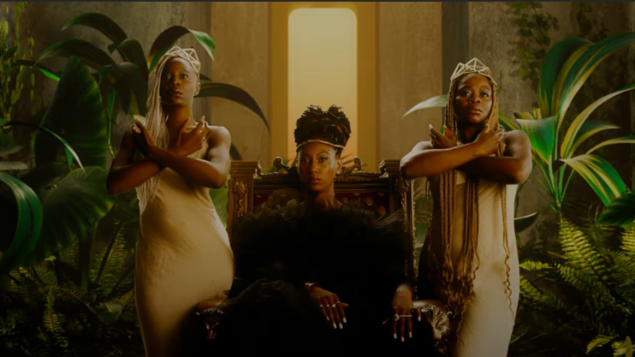This is my last Safe&Sound music column, which I started four months ago during the pandemic, and we are still not out of the woods. But the one thing I have learned during these chaotic times is how important it is to reconnect with ourselves and with humanity, find peace within, and reach out to our brothers and sisters from our better place.
And I would like to thank the life forces that put in my path the messenger that highlighted this message of love this week: Montreal up-and-coming jazz singer Dominique Fils-Aimé. This is all I needed, and what I’d like to share with you today, as the tapestry of the golden fall leaves is blown by the wind and chilly air settles down and there is nothing else to do but accept our renewed winter confinement.
“Do-Mi,” as is her nickname, has relentlessly sung about tolerance and inclusiveness, but also about rebellion and revolution ever since she appeared on Canada’s music radars two years ago. In Quebec though, she created a sensation when she took part in the very popular music contest La Voix back in 2015.
A ‘bootcamp’ in show business
She didn’t win the contest, but she believes she won all the same because that’s how she thinks: always positive. Behind any big machine, any industry, any system, she said in an interview, there are people, humans like you and me, and therefore, a way to connect. So, despite the pressure, what she calls a ‘bootcamp’ in show business has allowed her to learn the ropes of the trade, make friends, and gain enough confidence to start a professional career in music.
Although her nickname itself is musical (‘Do’ would be the C note and ‘Mi’ would be E), Do-Mi didn’t think of singing as a career at first. She enjoyed photography and painting, she studied public relations and fashion design, but her first job was in therapy. She worked giving psychological support for people working with autistic children.

“I went through a burnout and music has been like a cure for me,” said Dominique Fils-Aimé in an interview. (Photo Credits: Melika Dez)
Giving back to the community at every single opportunity, she recorded in 2015 a cover of a Tracy Chapman’s song for a campaign against domestic violence.
‘I have everything I need’
When Dominique Fils-Aimé started posting her own work on the internet, she was discovered by a talent scout of La Voix. In the end, music became the best way to follow her initial instinct and provide solace to human souls while respecting her own yearning to sing.
Emboldened by her experience at La Voix, she immediately recorded her debut, self-produced album entitled The Red EP. Backed by a band of young musicians with solid jazz training, the self-taught singer whose soulful, sensual voice often recalls Sade, started laying the foundations of her personal style, very different from the pop songs she was given to perform at La Voix.
Dominique Fils-Aimé is a hard-worker and a jack-of-all artistic trades. Her mom thought she would become a painter. And although she quickly quit modeling, the constant quest for beauty not being her cup of tea, she does style her own outfits for her shows.
But what she likes more is to write. When her manager gave her the opportunity to take six months to prepare her own recording material, she directly aimed at a trilogy : three albums as a musical odyssey into the collective memories of her brothers and sisters who came to the Americas as slaves.
A 200-year fight against inequality
For each album, she says she wrote between 30 and 40 songs, based on a pantheon of artists and thinkers who have been fighting inequality. In an interview, she mentions 2006 Nobel Peace Prize winner Muhammad Yunus who has been using microfinance to help poor people become entrepreneurs, or the neuroanatomist Jill Bolte Taylor who, when the left hemisphere of her own brain was incapacitated by a stroke, discovered that she could actually connect better with the world. The scientist, like many spiritual practitioners before her, invited people to find a better balance by adopting a less individualistic perspective.
Rise, the first single of the trilogy was released in September 2017 as a preview of the album Nameless. The main inspiration came from a poem by Maya Angelou, an American poet and civil rights activist who also became the first black female director in Hollywood.
Exploring collective memories
Do-Mi was also influenced by many Black singers such as Billie Holiday or Nina Simone, who both were subjected to racism, but also domestic violence. In Nameless, the first installment of her trilogy, Dominique Fils-Aimé adapted their seminal jazz standards Strange Fruit and Feeling Good.
Initially written by a white Jewish man from the Bronx in protest against the lynching of Black Americans, Strange Fruit was interpreted by Billie Holiday in 1939 and it played a central role throughout her career. It has been called “a declaration of war” marking the beginning of the civil rights movement, and Time magazine called it “the song of the century” in 1999.
In the face of the current resurgence of protests against systemic racism, Dominique Fils-Aimé said she has looked up at the stories of these leading black figures to determine what would be her own quest for self-determination between a path of violent rebellion or peaceful protest. Did she feel closer to Malcolm X or Dr Martin Luther King? The answer came through the music.
Music in a painter’s mind
Do-Mi explained the inspiration for the creation of her trilogy first came with colours associated with emotions. Each colour is linked to a style of music, and a dedicated album: first Nameless, released in February 2018, then Stay Tuned!, released one year later and a winner of many national awards, and now Three Little Words, which is in the final stages of production.
‘Physically separated but united more than ever’
‘Soothing’ is a word that would define Dominique’s voice and music. In March 2020, when the pandemic was just starting, she released some “lo-fi sounds in a demo format” she had self-produced while preparing the Stay Tuned! album. While sharing the intimacy of her creative process, she also delivered a warm message. A message of resilience despite physical distancing.
Stay Tuned! came out in February 2019 with 14 original songs that garnered a wide success in the critical and general media. The album was selected for the 2019 Polaris Music Prize, and won a JUNO Award for best Jazz album last July. She also won the Jazz album award at Quebec’s ADISQ Gala last year and, after touring Canada’s jazz festivals, was nominated again by ADISQ this year for the Best show of the year in English.
‘Jazz allows me to be myself’
Dominique Fils-Aimé says she spent the pandemic on her sofa at first to recharge her batteries after a very successful but hectic year, and then in the recording studio to prepare the latest installment of her trilogy. She said that recording makes her tremendously happy.
Do-Mi’s creative process is totally self-learned. She records every instrument line with her own voice and she marks the beats by tapping her hands on a table. Then, she shares this material with her academically-trained musicians, who are able to translate these indications and the spirit of her music on their instruments. This freedom, she says, is the reason why she feels “in her comfort zone” when singing her own jazz.
Healing through music
Last week, Dominique Fils-Aimé released the first single of her last album in the trilogy, with a video featuring two inspirational women that she believes deserve to be known. As she sits on her throne ruling over her ‘Queen-Dom’, writer Édith Kabuya and actress Tatiana Zinga Botao stand on each side of her like protective figures.
Dominique Fils-Aimé is scheduled to perform at the Montréal Jazz Festival on July, 1st, 2021 (Canada Day). She will also be on an extensive tour in Europe throughout the summer.
Read our previous Safe & Sound music columns :
- ‘Support the arts and save taxes!’, says Quebec’s classical music community
- Quebec rapper mourns Indigenous deaths, releases single called “Génocide”
- Urban Indigenous singer Anachnid extends her web across Canada’s soundscape
- Canadian pop star Shawn Mendes wins five SOCAN Awards and breaks a new record
- Montreal’s Indian summer is African this year. And it lasts 34 days
- In Eastern Canada, Musique Nomade stands by Indigenous musicians
- Orientalys festival brings music to the virtual stage, ‘as if you were there’
- US and Canadian festivals team up for a month of virtual world music shows
- Montreal’s Mural Estival closes the summer with street art and music
- “Fait Vivir”, a road movie about Canadian music gypsies in Colombia
- Music industry delegates meet online at a new global conference in Toronto
- Brazilian artist Diogo Ramos sings his love for Quebec, diversity and freedom







For reasons beyond our control, and for an undetermined period of time, our comment section is now closed. However, our social networks remain open to your contributions.